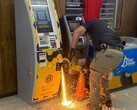It's a well-known fact that Bitcoin mining requires a lot of computing power, which unsurprisingly drives up electricity costs. Therefore, researchers at the company D-Wave have now presented a solution that might significantly reduce electricity consumption and costs when mining the currently biggest cryptocurrency in the world.
Less power consumption thanks to "Quantum Proof of Work"
Quantum computers are considered superior to conventional computers in certain respects because they can perform calculations much faster. Quantum computers don't use ordinary computer bits, but so-called qubits. These can’t just represent either 0 or 1, but multiple states of these two numbers thanks to superposition.
Recent research results have also introduced qudits, which are supposed to be even more efficient. Consequently, researchers can take advantage of these more efficient calculations and increase the mining rate.
According to the study, they were able to determine that power consumption can be reduced by a factor of 1,000 by using quantum computers. Specifically, the scientists used four quantum computers that were distributed across North America. Coincidentally, they also discovered that the individual quantum computers even worked together.
"Quantum Proof of Work" explained
Before explaining the mechanism behind Quantum Proof of Work (PoQ or QPoW), it's important to understand blockchain technology in general. In simple terms, this technology is a type of digital ledger in which all cryptocurrency-related transactions are recorded. In order to add new blocks to the chain, a large amount of computing power is needed to perform the necessary mathematical calculations.
With PoQ, these calculations are performed by a quantum computer with the process based on probabilities. This calculation method balances out errors while keeping the blockchain stable.
Disclaimer: The information reported here should not be used as a basis for any personal investment decision. Notebookcheck does not offer cryptocurrency, NFT, or other trading, investment, or financial advice.
Source(s)
Telepolis, Cornell University, Image source: Pexels / David Mcbee





















